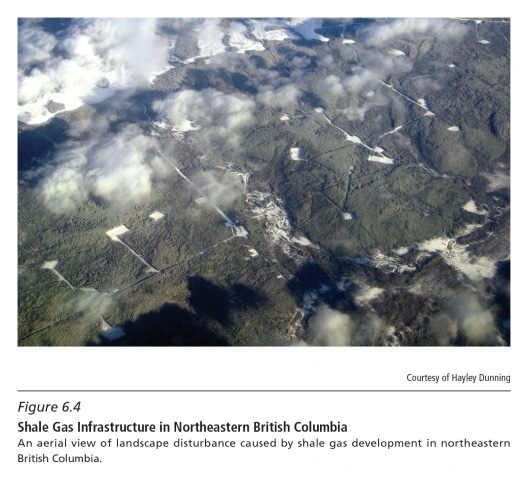There is simply not enough reliable information to be confident about the environmental impacts of hydraulic fracturing, according to a new report released by the Council of Canadian Academies.
The report, commissioned by Environment Canada, takes a broad view of the implications of “fracking,” from possible contamination of land and water to greenhouse gas (GHG) emissions to human health and social impacts. It identified several key areas of concern, particularly that pathways created by leakage of natural gas from “improperly formed, damaged or deteriorated cement seals” may contaminate ground water and increase GHG emissions.
Other issues of concern included:
- land damage due to the extensive infrastructure required by multiple wells, such as roads, well pads, compressor stations, pipeline rights-of-way and staging areas.
- health and safety issues related to the rapid growth of an extraction industry in rural areas.
- air pollution due to the heavy-industrial process of fracking for the extraction of natural gas.
- seismic events due to wastewater injection.
-
the contravention of the rights of Aboriginal peoples in extraction areas.
The report also notes the fracking process varies wildly depending upon the geography and population of the region under development. British Columbia, for example, with its mountainous landscape and vast unpopulated wildernesses, will face different challenges and require different study than Quebec, which is relatively low-lying and densely populated.
But overall, the report’s key criticism was the utter lack of reliable data on the contentious topic. “In most instances, shale gas extraction has proceeded without sufficient environmental baseline data being collected,” it concludes.
In an interview with CBC during the afternoon call-in show BC Almanac, John Cherry, the University of Guelph adjunct professor who headed up the study, pointed out that when issues do come up, industry has tended to sweep complaints under the rug.
As journalist Andrew Nikiforuk recently reported on The Tyee, a high-profile water contamination case in Alberta against natural gas giant Encana has been met with significant pushback from government. Claimant Jessica Ernst, a former environmental consultant for industry, is suing Encana and the provincial regulator for negligence and a violation of the Charter of Rights and Freedoms, respectively, in the contamination of her groundwater near the hamlet of Rosebud, Alberta.
Recently Alberta Environment sought to have the word ‘contamination’ struck from the lawsuit, as well as any other mention of polluted water wells in the region.
Nikiforuk also reports in many cases landowners who have suffered ill-effects from the fracking process have been made to sign non-disclosure agreements, making it impossible to draw reasonable conclusions about the frequency of problems or study the incidents to make future regulatory improvements.
Responding to statements by British Columbia energy minister Rich Coleman about the safety of fracking, Cherry was unequivocal: “Your minister is wrong,” he said. “There is no reason for government to be confident.”
His colleague, University of Pennsylvania professor Bernard Goldstein echoed that warning. “We’re racing ahead without seriously thinking through how best to do this,” he told the Globe and Mail.
The report argues that if natural gas extraction through fracking is to become a regular feature of the Canadian economy, there will need to be an extraordinary leap in scientific study. But that kind of research is “unlikely to occur without a concerted effort among industry, government, academia, and the public in each of the provinces with significant shale gas potential.”
Any realistic understanding of the issue will require a “crash course program of monitoring and research,” Cherry told the CBC.
Similar reports decrying the shortage of data and calling for enhanced monitoring appeared recently in the United Kingdom, Germany and Australia.
Subscribe to our newsletter
Stay up to date with DeSmog news and alerts







